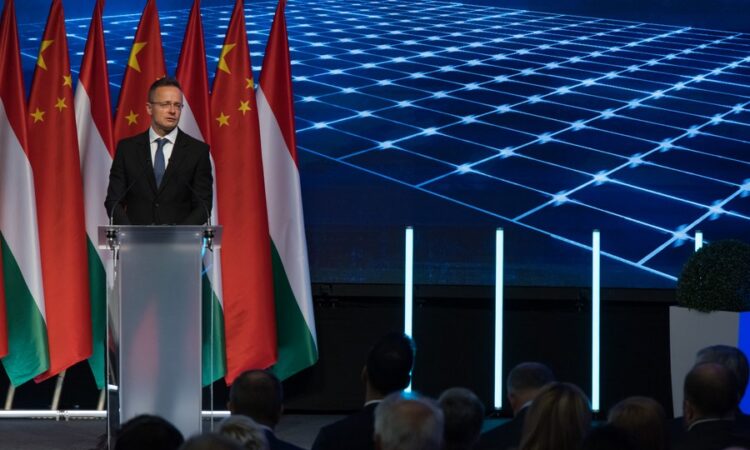

Hungarian Minister of Foreign Affairs and Trade Peter Szijjarto speaks during a ceremony in Debrecen, Hungary, on Sept. 5, 2022. (Photo by Attila Volgyi/Xinhua)
Szijjarto told journalists in Paris: “There will be an even deeper economic crisis if trade cooperation is cut off between the EU and China for ideological reasons, so it is crucial to maintain a mutually beneficial, pragmatic relationship.”
BUDAPEST, March 13 (Xinhua) — Relations between the European Union (EU) and China must be non-ideological and pragmatic, Hungarian Minister of Foreign Affairs and Trade Peter Szijjarto said on Monday.
Szijjarto told journalists in Paris: “There will be an even deeper economic crisis if trade cooperation is cut off between the EU and China for ideological reasons, so it is crucial to maintain a mutually beneficial, pragmatic relationship.”
Szijjarto was speaking after a meeting with the head of the Organization for Economic Cooperation and Development (OECD), Mathias Cormann.
“Whether Europe will be able to get out of the current, extremely challenging period, depends fundamentally on the approach of its decision-makers … will they be able to act on the basis of common sense instead of an ideological approach?” Szijjarto said.
“In order to leave the world economic crisis behind us, common sense is needed.”
The OECD is one of the few organizations globally that is not a “prisoner of ideologies” but ” pursues a “rational, realistic, common sense economic policy,” he said.
The Hungarian diplomat maintained that if economic and commercial cooperation is severed due to ideologies, either at the initiative of Western Europe or the United States, the European economy will not be able to avoid a deep recession.

A container of China Railway Express is seen at the Csepel Freeport Logistics Park in Budapest, Hungary on April 12, 2022. (Photo by Attila Volgyi/Xinhua)
It is in Europe’s fundamental interest to maintain pragmatic economic cooperation with China in the coming period, Szijjarto emphasized.
Hungary could provide an example to other EU member states, he suggested, since it is an important hub for the German automotive industry, as well as Chinese electric battery manufacturers. With the EU set to ban the sale of new fossil-fueled vehicles in 2035, more EV batteries will be required.
Most of the world’s top ten EV battery manufacturers are from China, Szijjarto underlined. Therefore, “if Europe cuts the threads of European-Chinese cooperation, then the European automobile industry will fail to implement its electromobility strategy, and endanger millions of jobs,” he warned.
Hungary has smashed investment records in recent years, since the country is an excellent center point for Eastern and Western companies, Szijjarto added.

EU flags are seen outside the European Commission in Brussels, Belgium, Jan. 6, 2023. (Xinhua/Zheng Huansong)■






